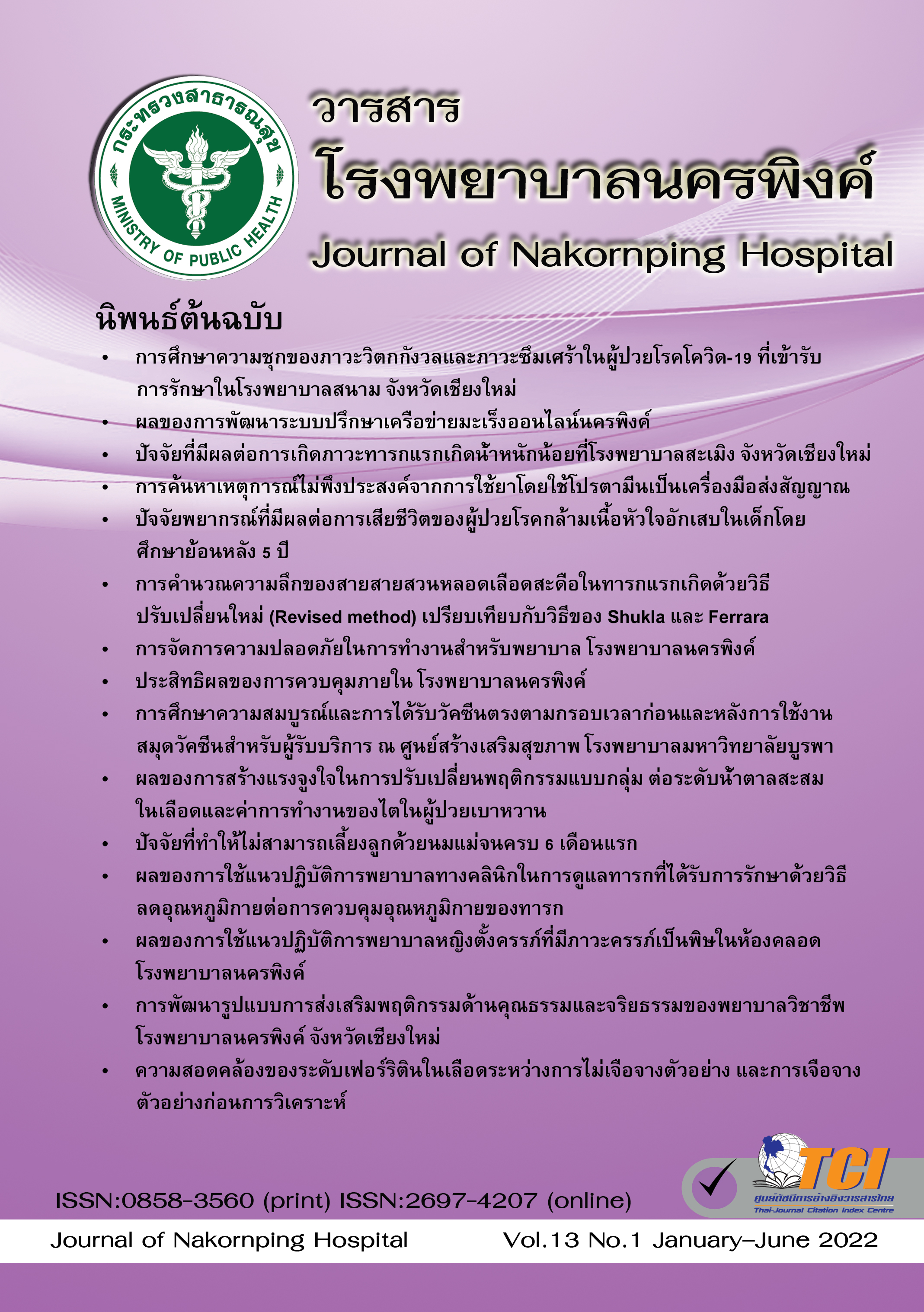Prevalence and factors influencing unsuccessful exclusive breastfeeding for the first 6 months
Keywords:
infants age 6 months, unsuccessful exclusive breastfeeding, influencing factorsAbstract
Objective: To study the prevalence and analyze factors influencing unsuccessful exclusive breastfeeding for the first 6 months
Methods: The cross-sectional analytical study was conducted in Nakornping hospital during January – December 2019 on mothers who have 6-month-old infants and met the inclusion criteria without randomization, 300 mothers were included in the study. We analyzed the prevalence and factors influencing unsuccessful exclusive breastfeeding for the first 6 months by descriptive study and logistic regression. p<0.05 was statistically significant.
Results: From a total of 300 mothers, the prevalence of unsuccessful breastfeeding was 57 percent. The factors influencing unsuccessful breastfeeding are the lack of knowledge regarding breastfeeding on reducing breast and ovarian cancers (OR 1.86; 95%CI 1.02-3.36; p=0.042), increasing 1 point about comfort in breastfeeding (OR 0.88; 95%CI 0.88-0.97; p=0.013), and lack of family support and influence on breastfeeding (OR 2.81; 95%CI 1.35-5.83; p=0.006)
Conclusion: From 57 percent of unsuccessful breastfeeding, the most influential factors is the lack of family support and influence on breastfeeding. Family factor is the most influential factor in first 2 months, which the husband is the key person
References
Ratanachu-ek S. Pediatric Nutrition Handbook. 4th ed. Bangkok: Clinical Nutrition Pediatrics Queen Sirikit National Institute of Child Health; 2015.
National Statistical Office, United Nayions Children's Fund, National Health Security Office. Thailand 14 Provinces Multiple Indicator Cluster Survey (MICS) 2015-2016, Final Report [Internet]. Bangkok: NSO,UNICEF; 2017. Available from: https://www.unicef.org/thailand/media/231/file/Thailand%2014%20Provinces%20Multiple%20Indicator%20Cluster%20Survey%20(MICS)%202015-2016.pdf
Ministry of Public Health, Office of the Permanent Secretary. Health Data Center: Information and Communication Technology Center [Internet]. Nonthaburi: Health Data Center. Available from: https://hdcservice.moph.go.th/hdc/main/index_pk.php
Office of the National Economic and Social Development Board. The Eleventh National Economic and Social Development Plan. Bangkok: The Prime Minister's Office; 2011.
Ministry of Public Health. Strategic Plan for Development Health Promotion and Environmental Health Systems, The Twelfth National Economic and Social Development Plan (2017-2021). Bangkok: Ministry of Public Health; 2018.
Ministry of Public Health. The way to drive the miracle of the first 1000 days of life. Bangkok: A.V. PROGRESSIVE LTD.; 2018.
Weerakul J. Factors related to successful breastfeeding for at least 6 months of postpartum mothers at Naresuan University Hospital. The 12th National Science Research Conference; 2016 May 6-7; Naresuan University. Phitsanulok: Naresuan University; 2016.
Owatanapanich S, Sommang K, Sukprasong P. actors Related to Successful Breastfeeding at King Narai Hospital, Lopburi Province. Journal of health science. 2015;24(2):200-10.
Payakkaraung S, Sangperm P, Samart C. Breastfeeding Problem in Early Postpartum Period: Mother’s Experiences. J Nurs Sci. 2016;34(3):30-40.
Sangkla J. Factors associated with exclusive breastfeeding: a case study in a semi-urban Area, Kanchanaburi [dissertation]. Bangkok: Mahidol University; 2014.
Siripongwattana N. Factors associated exclusive breastfeeding for at least 6 months of postpartum mothers at Ban Bueng Hospital, Chonburi. The 5th Thai National Breastfeeding Conference; 2015 Sep 2-4; Monthien Riverside. Bangkok: Thai Breastfeeding Center Digital Repository; 2015.
Dalili H, Farsar A, Barakati H, Raji F, Shariat M, Pourmalek F, et al. Frequency of exclusive breastfeeding and its affecting factors in Tehran, 2011. Acta Med Iran. 2014;52(7):552-6.
Bevan G, Brown M. Interventions in exclusive breastfeeding: a systematic review. Br J Nurs. 2014;23(2):86-9. doi: 10.12968/bjon.2014.23.2.86.
Skouteris H, Nagle C, Fowler M, Kent B, Sahota P, Morris H. Interventions designed to promote exclusive breastfeeding in high-income countries: a systematic review. Breastfeed Med. 2014;9(3):113-27. doi: 10.1089/bfm.2013.0081.
Silva CS, Lima MC, Sequeira-de-Andrade LAS, Oliveira JS, Monteiro JS, Lima NMS, et al. Association between postpartum depression and the practice of exclusive breastfeeding in the first three months of life. J Pediatr (Rio J). 2017;93(4):356-64. doi: 10.1016/j.jped.2016.08.005.
Mora AD, Russell DW, Dungy CI, Losch M, Dusdieker L. The Iowa infant feeding attitude scale: analysis of reliability and validity 1. J Appl Soc Psychol. 1999;29(11):2362-80.
AlKusayer NM, Midodzi WK, Newhook LA, Burrage L, Gill N, Halfyard B, et al. Psychometric Assessment and Precision Remodeling of the Iowa Infant Feeding Attitude Scale to Improve Clinical Use and Efficacy Among Prenatal Women in Canada. J Hum Lact. 2018;34(1):20-9. doi: 10.1177/0890334417741296.
Vacharaporn K, Pitanupong J, Samangsri N. Development of The Edinburgh Postnatal Depression Scale Thai version. J Ment Health Thai. 2003;11(3):164-9.
Downloads
Published
How to Cite
Issue
Section
License
Copyright (c) 2022 Nakornping Hospital

This work is licensed under a Creative Commons Attribution-NonCommercial-NoDerivatives 4.0 International License.
The articles that had been published in the journal is copyright of Journal of Nakornping hospital, Chiang Mai.
Contents and comments in the articles in Journal of Nakornping hospital are at owner’s responsibilities that editor team may not totally agree with.



